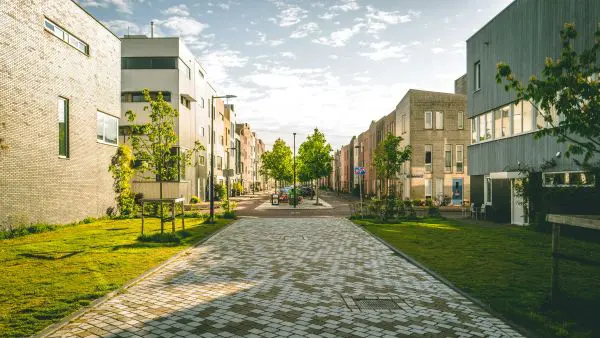What can you do with an urban planning degree?
Posted on: 26 March, 2025

If you’re looking to study urban planning, here are the various different pathways and career routes you can take once you graduate.
Urban planning is one of the most important professions in the built environment. It plays a pivotal role in shaping our cities, towns, infrastructure and communities, and impacts the lives of everyone.
Obtaining a degree in urban planning can open up a wide range of potential career pathways and opportunities, both within the field of planning and in the broader built environment. It can be a way to make a difference to people’s lives, design exciting new spaces, and participate in the push for net zero.
Yet becoming an urban planner isn’t your only option – here are 8 more professions you can explore with an urban planning degree:
1. Town planning
A career as a town planner is one of the most common pathways urban planning graduates take after completing their studies. It’s a great role for people who want to take on the mantle of responsibility, engage with the public, and address the complex needs of specific communities.
Town planning is focused on the use and allocation of land, with the ultimate goal being sustainable development through the balancing of social, environmental and economic factors.
2. Local authority planning
Local Planning Authorities (LPA) grant planning permission, devise local plans for land use and conduct environmental impact assessments (EIA).
Professionals in this area focus on small, local areas, balancing the needs of communities with social, economic and environmental concerns. Their remit is similar to that of town planners, except they specifically work within local governmental bodies.
3. Transportation planning
The practice of planning extends beyond the structures we inhabit into the infrastructure we utilise, including paths, roads, bridges and motorways.
Transportation planners are focused on implementing plans that optimise transportation systems, from bike lanes and pedestrian paths to roads and public transit routes.
There’s no shortage of demand for this area of planning expertise. Issues arising from transportation like congestion and sustainability are prevalent across the world, with professionals working across the public and private sector.
If you enjoy problem solving and are passionate about sustainability, this is a great way to make an impact.
Learn more: Why is the traffic in my city so bad?
4. Planning consultancy
Working as a consultant or as part of a consultancy is another option for individuals considering a career in planning. Instead of solely working with specific, local regions, planning consultants have the opportunity to provide their expertise to a wider variety of clients.
As professionals working in a rapidly evolving area of the built environment governed by regulation, planning consultants are often brought in due to their knowledge of legislation and specific regions to help navigate controversial or high-risk projects.
5. Planning conservation
Planning isn’t purely concerned with future developments – it also extends into the conservation and preservation of the natural environment.
Conservation planning focuses on protecting biodiversity, preserving history and culture and helping the public engage with heritage. This could be a particularly appealing area for individuals motivated by sustainability and climate change.
6. Urban regeneration
Urban regeneration is an investment strategy where money is spent redeveloping urban areas. It’s a common practice, not just in the UK but throughout the world, and holds the promise of economic growth, emission reductions and cultural regeneration.
Learn more: Urban regeneration, defined: here’s why it matters
However, regeneration initiatives are one of the most divisive areas within the planning profession. Without proper implementation, they can actually have negative impacts on communities and fuel inequality. This makes it all the more important for skilled, qualified and passionate professionals to be brought into this discipline.
7. Building surveying
Obtaining a degree in urban planning doesn’t mean you’ll be forced to pursue a career in this field.
As a broad discipline, the skills and knowledge you develop in planning can, alongside relevant experience, can help you launch or further a career in other built environment fields, such as building surveying.
Building surveying is one of the broadest and most varied roles in the sector, and one that covers the entirety of the building lifecycle. As such, the skills you can develop on an urban planning degree will put you in a good position to begin a career in this diverse field.
8. Real estate
Another area that overlaps with urban planning is real estate development. Expertise in land use and planning regulations and policies can be instrumental in navigating real estate projects. Similarly, market analysis skills and experience with geographic information systems (GIS) can also be relevant to roles in the real estate industry.
Discover where an urban planning degree can take you
If you’re excited by the career prospects an urban planning degree can offer you, now is the perfect time to start your journey.
UCEM’s MSc Urban Planning was launched to address the shortage of skilled planners in the built environment and the rising need for sustainable development. On this programme, students will explore the entire planning process and learn how to navigate the complex web of policies and regulations behind the creation of our urban spaces.
To satisfy demand from employers for skilled planners, a Level 6 Chartered Surveyor Urban Planning apprenticeship has also been introduced.





